RPG Organization
Map of North Village Areas

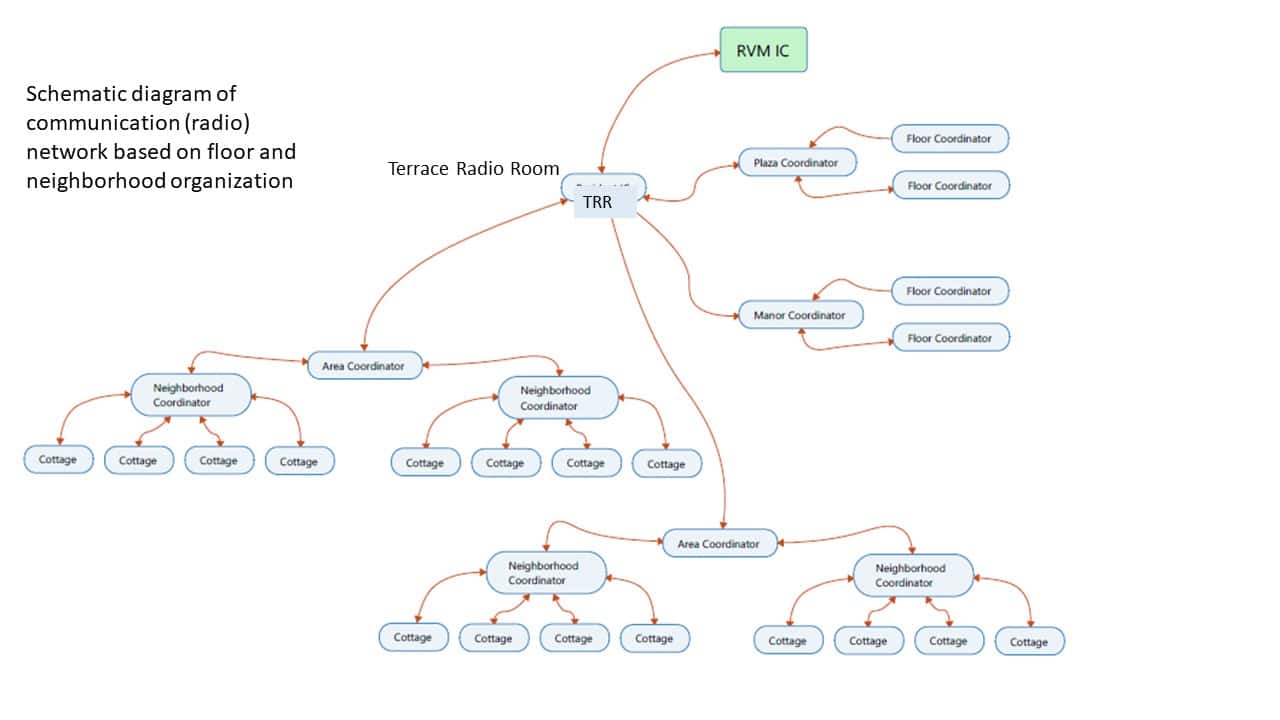


Resident Preparedness Group (RPG)
Leadership Team, 8/9/21
RPG has restructured and enlarged its Leadership Team to achieve several objectives:
Current Composition
Bob Buddemeier
Dan Curtis
Bob Berger (new resident; see bio below)
Teddie Hight (Manor Representative
Jim Macmillan (Plaza representative)
Ken Kelley
Scott Wetenkamp
Bob Walden (phasing out, but continuing to offer assistance in the transition)
Don Barry (phasing out, but continuing to offer assistance in the transition)
Dan Wagner (former member still contributing database efforts, reviews and advice)
Bob Berger Experience
Academic training focused on biochemistry, physiology and marine biology. Work experience primarily involved in environmental toxicology. Worked for private engineering and consulting firms, and public sanitation and drinking water agencies. The last 9 years of my career provided regulatory/ legislative efforts for sanitation and drinking water agencies in Sacramento and Washington, D.C.
No direct experience in emergency preparedness or management, but did complete Communities of Oakland Respond to Emergencies, CORE, training now identified as CERT ( City of Oakland | Community Emergency Response Team Training [CERT]
Do you want to get a personal email notification of a new Complement issue or new material? Email us at openinforvm@gmail.com and we will put you on the mailing list
Past articles are all on display; If there is a “Load More” link at the bottom of the page, clicking it will bring up the older articles.
Neighbors Together, by Carolyn Bennett
-Getting to know you…
Putting on the Saddle and Riding the Horse, by Joni Johnson
-Putting her estate matters in order — for real
Sick of it…or Sick with it? by Bob Buddemeier
-More about COVID, but read it anyway
Mirabella Monthly, Newsletter of the Seattle Mirabella (Current issue)
Heatwave, by Eleanor Lippman
-Remembrances of a summer past
RVM August – October Event & Entertainment Schedule
August Library Display, by Anne Newins
Three Hundred Cups of Tea and The Toughest Job — (Book Review), by Joni Johnson
The Wisdom of Psychopaths — (Book Review), by Bob Buddemeier
WHEN RETAILERS COLLIDE!, by A. Looney
–Nit-Wit Newz sells out!
A New Look for RPG Coordinators, by Bob Buddemeier
-It’s not easy being green!
The RPG — A Summary Description, by the RPG Leadership Team
-One page, many answers
All of those have happened, and will happen again. You need to decide in advance whether or not you want to be a survivor, because if you don’t make that choice and act on it, you have effectively chosen to be a victim.
RVM has emergency plans, equipment, supplies, and dedicated employees — but it is a retirement community, not a response, rescue and relief organization. There are major limitations on what support and protection we can expect if something really bad happens.
WHAT YOU NEED TO BE PREPARED TO DO
3. Shelter in place — Cottages
3.1 Emergencies other than wildfires
3.1.1 Stock two weeks worth of nonperishable food, water, household supplies and needed equipment (See How to Prepare), or as much of that amount as is practical.
3.1.2 Be prepared to be without electricity, gas, running water and sewage disposal — this means no cooling, heating, and extremely limited washing
3.2 Wildfire evacuations — Shelter at RVM
3.2.1 In the event that a wildfire evacuation (Level 3) Alert is issued by the civil authorities, residents may self-evacuate (see above) or shelter in the high-rise buildings.
3.2.2 Evacuation to a high-rise shelter is very different from self-evacuation off-site: Transportation is provided by RVM, the amount of material you need to — and can — take with you is more limited, specific preparations for pets must be made, etc. See the fire evacuation instructions and How to Prepare.
Prepare for Disaster at Two Levels — the personal and the community level. You live or die at the personal level — but the community can have a major influence on which outcome happens.
For all situations — know the RVM procedures, your RPG Coordinators, and your neighbors.
ACCESS TO RESOURCES
WHAT YOU NEED TO BE PREPARED FOR
HOW TO PREPARE
ACCESS TO RESOURCES
Resident Resources — the Resident Preparedness Group (RPG) is a volunteer organization that strives to support RVM preparedness efforts by ensuring that every Independent Living resident is within a short walk of a volunteer with a commitment to emergency preparation and response. These are the Neighborhood (in the cottages) or Floor (in the towers) Coordinators. To learn about the RPG and identify your Coordinator, go to RPG — Activities and Organization. Then meet him or her, and become part of the preparedness network. The network is everybody — you and your neighbors. The better you know each other, the better your common preparation will be.
RVM Resources —
Information resources —
UNDER CONSTUCTION — TENTATIVE OUTLINE
Potential responses
FAQs
Ability to respond effectively
[With links down- or off-page to expanded articles, and ultimately (2nd order) to the How to]
About two years ago, it occurred to me to write a “what if” letter to my children. I closed my eyes and imagined what it would be like if my children were called to the Manor and I was unable to give them any instructions.Who would they contact here at RVM? How would they gain access to my cottage? Once in my cottage, then what? Where and how to begin?
So, I wrote it all out, kept a copy in my “INFORMATION” notebook, and mailed each of them a copy.
And then . . . .
Beth Knorr’s “Implementing Your Estate Plan” showed up in my mailbox. I filled it out and realized:
* Dr. Prulhiere is no longer my primary care doctor
* the US Bank branch in the Manor is gone
* my financial advisor retired and sold the business
* my dentist sold her practice and moved to be near her husband
* I have renamed some of my important computer files related to such things as finance
* passwords have changed
* paperwork required by the Manor had not been updated
* and much more . . . .
So, my promise to myself is that every year on my birthday, I will open the “INFORMATION” notebook and update any information that has changed. It will be a birthday present to myself and my children.
This is a series of articles about the Peace Corps as they were experienced by RVM residents. They will be offered over the next few months.
My actual memories of my time in Peace Corps are limited because they happened so long ago and because I didn’t really keep a diary or make notes. But what remains clear is how that experience was absolutely instrumental in my growth as a person. Each story in this Peace Corps series will be different. One happened around the same time as mine but in a different context. And the other two stories took place in the lives of the volunteers when they were in their forties and fifties and sixties. And of course, that in itself would affect a person in totally different ways than it affected me. But in all cases, as you will see, being a Peace Corps volunteer was a life changing event.
I went into the Peace Corps in 1967 with my first husband. I was a teacher of ESL at a Boys Boarding School in Izmir, Turkey, and he was there to help the new Tourism industry. I can honestly say that it was one of the most important experiences of my life because of my exposure to another culture in spite of the beginning of the huge cultural upheaval going on in the United States thanks to the Vietnam War and the beginning of the Hippie movement. I missed a lot of the major events of that era in the US- The assassinations of Martin Luther King and Bobby Kennedy, the Kent State Protests and those in Chicago as well as the trial of the Chicago 7.
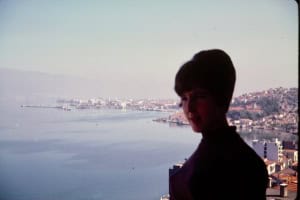
View from My Apartment
On the other hand, I was immersed in the wonderful Turkish culture. Many people talk of their Peace Corps life of fabulous emotional experiences but somewhat physical deprivation. I definitely had the fabulous emotional experiences, but my physical existence was fabulous as well. We were paid what others were paid for the same position in the same town where they lived. That meant that we got the equivalent of $100 per month, which allowed us to live in an apartment in a very middle-class part of town with views overlooking the Aegean sea.
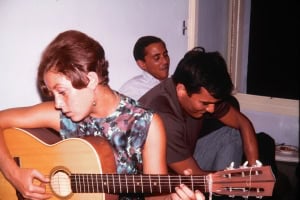
Joni and a Turkish friend and another Peace Corps volunteer hanging out together
It was true that we didn’t have a refrigerator, so that meant that we bought our meat, fruit and vegetables each day at the market on the way home. It was true that we didn’t have a clothes washer, so we did have to boil our clothes in a large pot on the stove. But if I remember correctly, we made enough to hire someone to clean our house and boil our clothes, so life wasn’t so bad. I remember the daily baked bread being delivered to the apartment, and so I started my day with freshly baked bread and freshly ground peanut butter. I gained 10 pounds the first month on the job and had to seriously rethink my diet.
I worked at the Bornova Maarif Koleji which was in a suburb of Izmir. It was a boarding school for boys and went from late elementary to high school. I taught all levels of English. I had taught science in my real life, but my minor in college was English. However, the Peace Corps gave us the tools with which to teach our students. Unlike many of the schools in Turkey, where teachers had to teach classes of 60 or more students, our classes were more like twenty-five. We got to know our students very well. Many of them went to summer camp with us which was lots of fun.
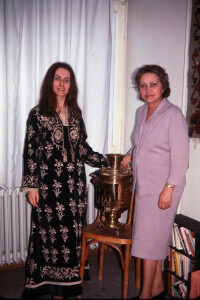
A Turkish friend wearing an antique Turkish wedding dress
My Turkish never gained the competence of those living in more rural areas. Living in a big city, most of my Turkish friends spoke English better than I spoke Turkish. But the relationships we built there were unforgettable. I can honestly say that the Peace Corps experience continues to change and affect my life. I appreciate other cultures and peoples in ways I doubt I would have. I know it has helped me with jobs. And I still keep in touch with some of my old friends.
We were the first Peace Corps training group that did not have to pass a “boot camp” requirement. Thank goodness. I don’t know if I could have joined. The biggest challenge in Turkey was not physical. It was political. At the time, Turkey and Greece were not friendly with each other. And there was some tension around how our government was dealing with the two countries, especially as it related to Cyprus. In fact, the Peace Corps only stayed in Turkey until 1971 largely because of the political issues and their concern for their volunteers. One time, several volunteers jokingly said that Ataturk had been Greek. They were sent home.
Tom and I went back to Turkey in 2013, and by accident, I reconnected with one of my old students. All of a sudden, word was out and I was getting emails from students who still lived in Izmir and wanted to see me when we arrived there as part of our trip. It turned out that one of them was now the president of a major university, and his friend (also an old student of mine) actually remembered where I had lived almost sixty years before and took us there, gained entrée with the current resident and we got a tour of my former apartment. I can’t even begin to describe my feelings about that wonderful day.
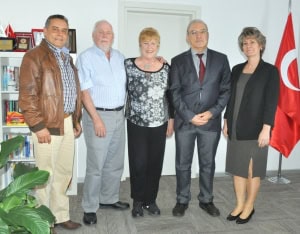
Joni and Tom with her old students in Izmir in 2013
by Bob Buddemeier
After recent experiences and in the midst of another ferocious fire season in the Western US, RVM residents can take some comfort in the dedication of staff to developing and improving emergency preparedness, and planning for effective action.
In the recent Residents Council meeting, Executive Director Stan Solmonson outlined the new procedures for responding to wildfire alerts – and especially evacuations.
Unlike the whole-campus mandatory evacuation we underwent for the Almeda fire, any future Level 3 Alert for the Manor would provide the opportunity to shelter in place in the high-rise buildings for any residents who cannot, or do not wish to, self-evacuate. Those who are able to leave will be free to do so, subject only to the need to check out with a staff member or RPG coordinator so that RVM can keep track of residents still present.
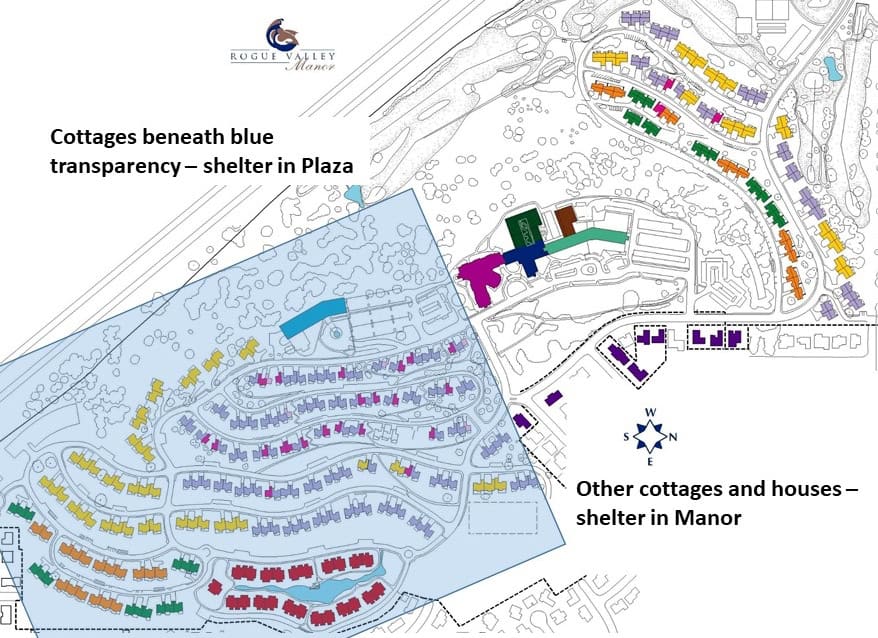 If an evacuation is ordered, tower residents who choose not to leave (as well as licensed facility residents) will remain in place in the towers. Cottage residents who do not evacuate off campus will be transported to the towers – North Village and RVM Drive to the Manor, and South Village to the Plaza.
If an evacuation is ordered, tower residents who choose not to leave (as well as licensed facility residents) will remain in place in the towers. Cottage residents who do not evacuate off campus will be transported to the towers – North Village and RVM Drive to the Manor, and South Village to the Plaza.
Associate Executive Director Alexander ben Israel has stressed that cottage residents who remain on campus must NOT drive to the towers, as congestion and parking problems would further complicate the situation. RVM buses will circulate to transport those who need to evacuate to the high-rises.
Is this safe? We can have confidence in the decision. RVM Administration has consulted extensively with emergency authorities and undergone Fire Department inspections. The plan is approved by the Fire Marshall, based on the nonflammability of the high-rise construction and the lack of local fuel and fire pathways.
In an earlier Friday briefing, Stan enumerated some of the precautions already taken – clearing the perimeter fire road, providing irrigation for the hillslopes, removing flammable waste such as compost material, and maintaining an ongoing program of fuel reduction by Facility Services.
In addition to general practicality, this plan will benefit the most vulnerable members of our community – those who are ill, frail, or confused. They will be spared long trips to unfamiliar destinations under unpleasant and potentially dangerous conditions, and will be able to receive very nearly their normal level of care.
The details of the plans and procedures are still under development, and more information will be forthcoming. However, we can rest assured that there is continuing attention and effort going into upgrading our emergency preparedness and defenses.
by Bob Buddemeier
 You will soon be seeing people stunningly attired in lime-green safety vests. This is the distinctive emergency garment of our Residents’ Preparedness Group (RPG) volunteers. We hope that your first viewing will be in a training exercise – but the ultimate purpose is to equip and identify them as volunteers assisting RVM Management in preparing for and responding to emergencies.
You will soon be seeing people stunningly attired in lime-green safety vests. This is the distinctive emergency garment of our Residents’ Preparedness Group (RPG) volunteers. We hope that your first viewing will be in a training exercise – but the ultimate purpose is to equip and identify them as volunteers assisting RVM Management in preparing for and responding to emergencies.
The RVM Emergency Planning Task Force (Alexander ben Israel, Drew Gilliland, and Jens Larsen) has been meeting with the RPG Leadership Team (Bob Buddemeier, Bob Walden, Dan Curtis, Don Barry, and formerly Dan Wagner). The two groups are now in the process of working on joint plans and procedures for cooperation in dealing with a variety of emergencies and disasters.
With formal roles and responsibilities for the RPG Coordinators taking shape, it became clear that they needed to be recognizable by staff and by other residents, and suitably prepared. Some resident donors volunteered to fund the purchase of vests and other supplies.
The vests selected are mesh (cooler in hot weather), and have both attachments for radios and six pockets that can be used to store and carry supplies and small equipment. The color and striping will enhance visibility and identification in low light conditions, and lime green was chosen because it stands out much better than orange against a background of flames (joke – we hope).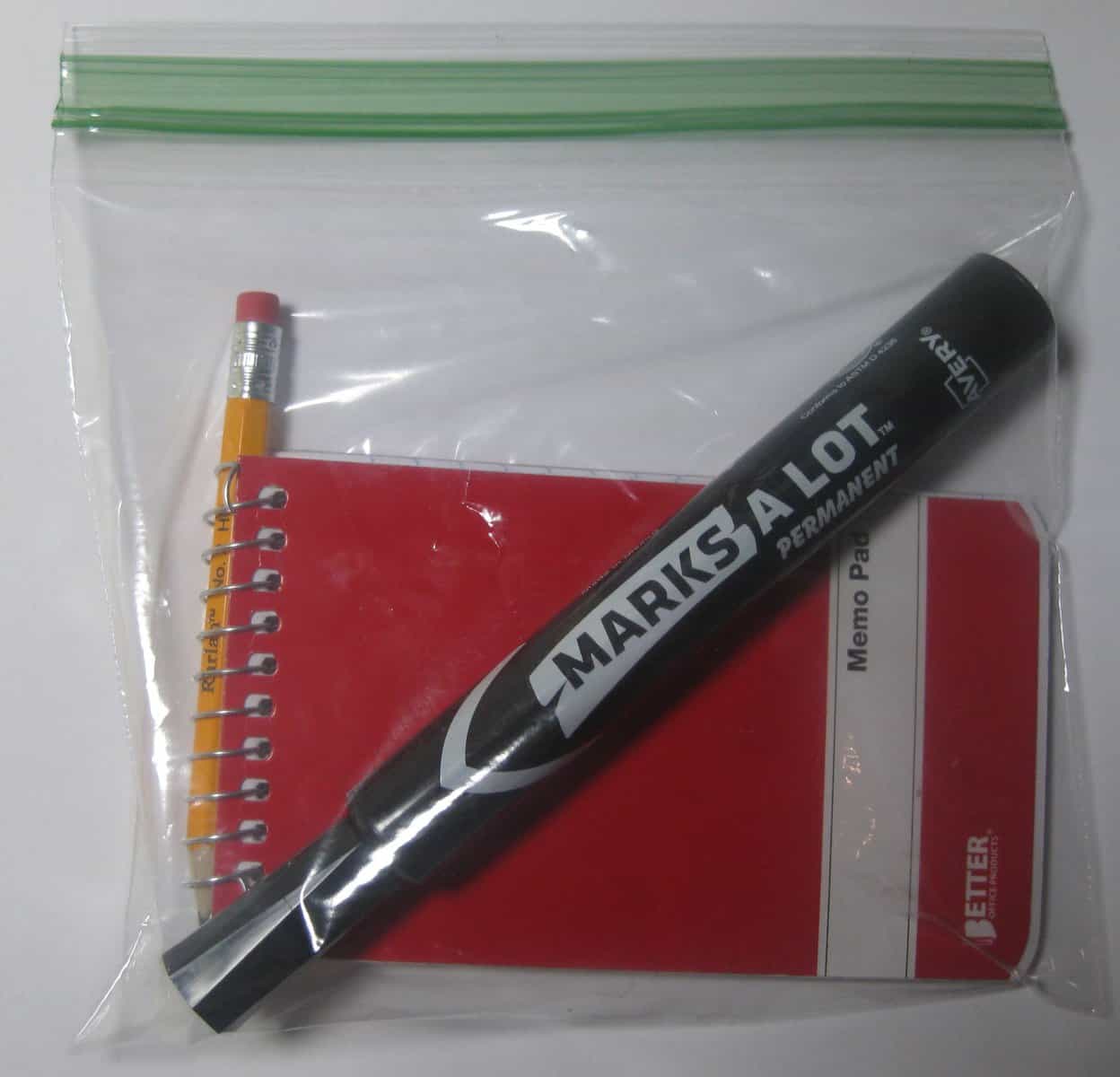
As a starter kit of supplies, each vest comes with a pocket notebook, a short pencil, and a chisel-point black permanent marker. The primary role of the RPG is supporting RVM in the areas of communication and collecting, recording and transmitting information. The starter kit provides tools of these trades, and add conventional technologies to the radio network currently being established.
 Hand-held radios (colloquially called walkie-talkies) have been purchased with Resident Council funds for all Area, Building, Floor, and Neighborhood coordinators. These are intended to link the RPG coordinator structure to the RVM Emergency Incident Commander or to other critical emergency resources. The network and procedures have been designed by the RPG Radio Communication Team, headed by Dan Curtis.
Hand-held radios (colloquially called walkie-talkies) have been purchased with Resident Council funds for all Area, Building, Floor, and Neighborhood coordinators. These are intended to link the RPG coordinator structure to the RVM Emergency Incident Commander or to other critical emergency resources. The network and procedures have been designed by the RPG Radio Communication Team, headed by Dan Curtis.
Most of the cottage Neighborhood and Area coordinators have been supplied with radios, and Ken Kelley is conducting training sessions. Once the system has been tested and the RPG-RVM links developed, radio distribution and training in the towers will begin.
Although a fully operational system is still some time away, each of the steps being taken brings us closer to an integrated and effective approach to dealing with major problems at RVM.